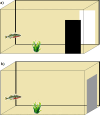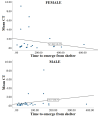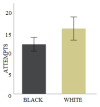Are lateralized and bold fish optimistic or pessimistic?
- PMID: 38833197
- PMCID: PMC11150292
- DOI: 10.1007/s10071-024-01876-4
Are lateralized and bold fish optimistic or pessimistic?
Erratum in
-
Correction to: Are lateralized and bold fish optimistic or pessimistic?Anim Cogn. 2024 Oct 8;27(1):65. doi: 10.1007/s10071-024-01894-2. Anim Cogn. 2024. PMID: 39377826 Free PMC article. No abstract available.
Abstract
Cognitive bias is defined as the influence of emotions on cognitive processes. The concept of the cognitive judgement bias has its origins in human psychology but has been applied to animals over the past 2 decades. In this study we were interested in determining if laterality and personality traits, which are known to influence learning style, might also be correlated with a cognitive bias in the three-spined sticklebacks (Gasterosteus aculeatus). We used the judgement bias test with the go/no-go procedure where fish were first trained to discriminate between a black and white card and, after reaching a minimum learning criterion, tested their response to an ambiguous card (grey). Optimistic subjects were expected to have a high expectation of reward associated with an ambiguous stimulus, whereas pessimistic subjects a high expectation of non-reward. We used an emergence and a mirror test to quantify boldness and laterality, respectively. We hypothesised that male, bolder and more strongly lateralized fish would be more optimistic than female, shy and less strongly lateralised fish. We found that males and more strongly lateralized fish were more optimistic than females and less strongly lateralized fish. In addition, bold males were more optimistic than shy males as we predicted, but females showed the opposite pattern. Finally, fish trained on the black colour card learned the training task faster than those trained on a white card. Our results indicate that both laterality and personality traits are linked to animals' internal states (pessimistic or optimistic outlooks) which likely has broad implications for understanding animal behaviour particularly in a welfare context.
Keywords: Boldness; Cognitive bias; Fish; Laterality; Learning; Optimism versus pessimism.
© 2024. The Author(s).
Conflict of interest statement
The authors declare no competing or financial interests.
Figures






References
-
- Archard GA, Braithwaite VA (2011) Variation in aggressive behaviour in the poeciliid fish Brachyrhaphis episcopi: Population and sex differences. Behav Process 86(1):52–57. 10.1016/j.beproc.2010.09.002 - PubMed
-
- Barker TH, Howarth GS, Whittaker AL (2016) The effects of metabolic cage housing and sex on cognitive bias expression in rats. Appl Anim Behav Sci 177:70–76. 10.1016/J.APPLANIM.2016.01.018
-
- Bateson M, Matheson SM (2007) Performance on a categorisation task suggests that removal of environmental enrichment induces pessimism in captive European starlings (Sturnus vulgaris). Anim Welf 16(S):33–36
MeSH terms
LinkOut - more resources
Full Text Sources
Other Literature Sources
Miscellaneous

